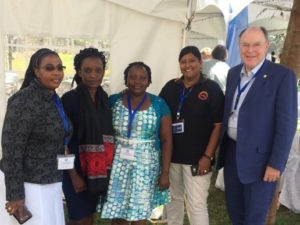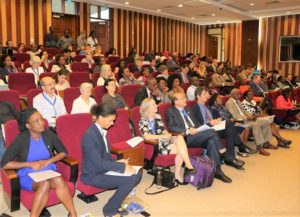In December 2016, CommonAge was strongly represented at the 2nd Africa Region Conference of the International Association of Geriatrics and Gerontology (IAGG) in Nairobi, Kenya. With a focus on long term care solutions, this was an important event for the interests of older people across Africa and was attended by around 500 professionals including older people from all Commonwealth countries in Africa.
CommonAge was represented at this important event by:
- CommonAge Chairman, Andrew Larpent
- CommonAge Ambassador Emily Ajiambo, Senior Gerontologist, Ministry of Gender, Labour and Social Development of the Government of Uganda,
- CommonAge Ambassador Hilda Akinyi Owii Research Assistant, the African Population and Health Research Centre in Kenya,
- CommonAge Ambassador Femada Shamam, Chief Operating Officer, The Association for the Aged in South Africa
- CommonAge Ambassador Sister Lucia Raseipone, Manager of St Antonine’s Home for the Aged in South Africa.
Both Hilda and Emily gave excellent presentations and both spoke with authority and passion about their work and experience in supporting older people in their countries.
“The conference was particularly significant for the Africa region and more widely as it brought together policy developers from the UN, the WHO and the African Union with academics and service providers from across the continent,” says Andrew. “Our delegates were made warmly welcome and there was much interest expressed by delegates in the development of CommonAge.”
Femanda highlights themes which emanated from the presentations and the small group discussions at the conference included:
- Diversity of national instruments which inform the provision of long-term care.
Some countries have progressed substantially in terms of their national policies and accompanying legislature to protect and provide for the elderly. In some countries, the stakeholders continue to lobby for recognition of the elderly and the need for a policy around their care and services.
- Training and capacity building
Many speakers highlighted the importance of training the caregivers appropriately. This includes both formal (from a service provider) and informal caregivers (members of the family, volunteers). The recommendation from the conference was that geriatrics and gerontology be mainstreamed in the education system for all role players including social workers, nurses, police etc. A further recommendation was that caregiving be incentivised.
- Practice models for long term care in the different countries.
It was highlighted the responsibility for providing long-term care cannot be met by the family alone. It requires transdisciplinary integration. It was increasingly obvious that the elderly could not be excluded from the discussions on long-term care. It was further expressed the elderly would like to have a choice of what type of care they require and when they require it. Central to any practice model of care was the elders themselves. The issues of affordability and accessibility was highlighted by many presenters. It was suggested that an economic perspective of care be adopted which entailed understanding the cost of care as well as issues of supply and demand. A key feature of any long-term care model is the scalability of the services while maintaining affordability.
In addition, there were many discussions around age friendly environments and the role of the environment in ensuring that people can age in place.
“The conference was a great networking opportunity,” confirms Femada. “It helped to highlight some options for making long term care an affordable and accessible reality in our countries.”
She also highlights the conference provided a platform for the CommonAge delegates to strategise on a way forward in terms of an Africa Chapter for CommonAge.
“Since the conference, I have made contact with a service provider with a view to forming a partnership on some assessment instruments to inform the process of planning and monitoring long term care,” she says.
Femanda and Sr Lucia have since met and will be holding a feedback session to organisations in Kwa Zulu Natal, South Africa in the next few weeks. “In addition, I will be hosting a feedback session in Cape Town with the assistance of the SA Care Forum,” says Femada.


